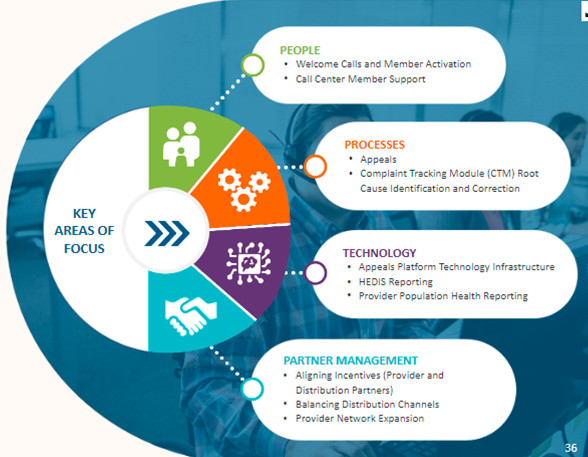At the core of Centene’s failures to comply with their legal and contractual obligations is a rickety collection of customer facing and back office processes akin to WorldCom, a company that, like Centene, grew by multiple large acquisitions but failed to integrate and consolidate programs and processes.
Centene’s CEO and Chief Transformation Officer have acknowledged the inadequacy of the company’s IT infrastructure and other resources necessary to be compliant with the company’s obligations to State Medicaid Agencies and the federal government.
On Centene’s Q2 2022 Earnings Call (at around 58:40) held on July 26, 2022, Sarah London, the company’s CEO stated that it is “[v]ery hard to run an enterprise quality program at [Centene’s] level of size and scale in a decentralized model.”Centene’s Executive Vice President and Chief Transformation Officer, Jim Murray, stated at the company’s Virtual Investor Update (at around 31:50) on June 17, 2022, “Today we have over 5 major IT platforms and over 500 applications supporting those platforms.” The goal, according to Mr. Murray, is for the company “to consolidate to one platform with fewer than 100 applications within the next three to four years.” (Emphasis added).
It beggars the imagination that Centene believes itself entittled to three to four years to make its operations fit for purpose when the company claimed to possess such competency as an inducement State Medicaid Agencies to select Centene as a managed care organization.
Key Areas of Focus
Centene’s Mr. Murray detailed “Key Areas of Focus” in his presentation that tie directly to the information set out in other posts that demonstrate Centene’s numerous operational, internal control, and disclosure failures. The Key Areas of Focus include:
Appeals Processes
Complaint Tracking Module Root Cause Identification and Correction
Appeals Platform Technology Infrastructure
HEDIS Reporting (a comprehensive set of standardized performance measures designed to provide purchasers and consumers with the information they need for reliable comparison of health plan performance)
Provider Network Expansion
Call Center Member Support
A Damning Self-Indictment
Provider Network Expansion being listed as a Key Area of Focus is a damning self-indictment by Centene.
As set out in multiple lawsuits filed against the company, in reports by state regulators (e.g., Illinois Department of Insurance), in numerous research studies, and in subsequent posts in this series, Centene fails to contract with adequate numbers of medical professionals to meet the demands of their plan members and Medicaid enrollees.
As detailed in subsequent posts, Centene uses “ghost networks” to appear compliant with its provider network obligations to State Medicaid Agencies. Ghost networks consist of health care providers listed in Centene’s provider network directories that are not in fact members of those networks (fake in fact) or see few or none of Centene’s Medicaid enrollees (fake in application).
A research article published in July 2022 found that between one-half to two-thirds of behavioral health professionals listed in provider directories for the fifteen community care providers (CCOs) in Oregon had not provided services to any CCO enrollees in the past twelve months. Trillium, a Centene subsidiary, is one of those CCOs.
Centene fails to disclose to investors the widespread inadequacy of its provider networks and the potential consequences of such inadequacy on the financial condition of the company and the value of Centene securities held by investors.




